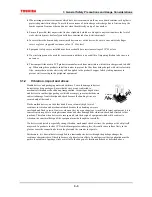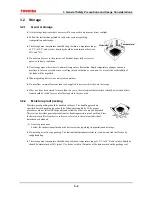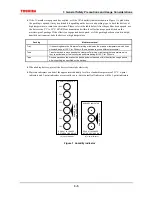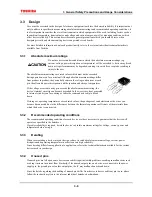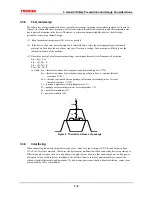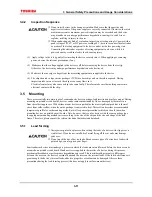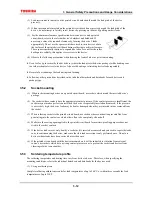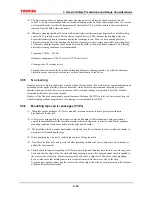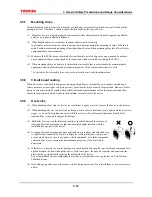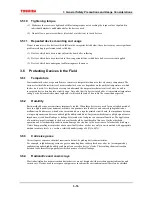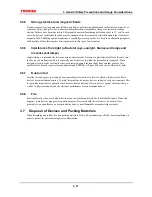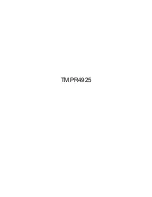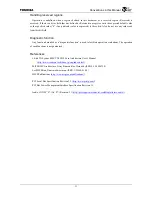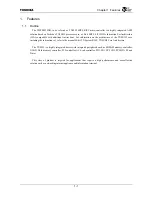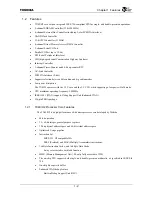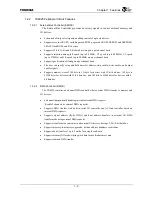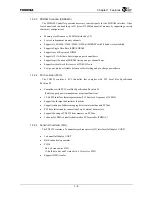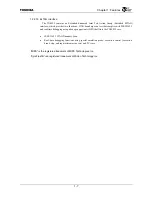
3 General Safety Precautions and Usage Considerations
3-17
3.6.5
Strong electrical and magnetic fields
Devices exposed to strong magnetic fields can undergo a polarization phenomenon in their plastic material, or
within the chip, which gives rise to abnormal symptoms such as impedance changes or increased leakage
current. Failures have been reported in LSIs mounted near malfunctioning deflection yokes in TV sets. In such
cases the device’s installation location must be changed or the device must be shielded against the electrical or
magnetic field. Shielding against magnetism is especially necessary for devices used in an alternating magnetic
field because of the electromotive forces generated in this type of environment.
3.6.6
Interference from light (ultraviolet rays, sunlight, fluorescent lamps and
incandescent lamps)
Light striking a semiconductor device generates electromotive force due to photoelectric effects. In some cases
the device can malfunction. This is especially true for devices in which the internal chip is exposed. When
designing circuits, make sure that devices are protected against incident light from external sources. This
problem is not limited to optical semiconductors and EPROMs. All types of device can be affected by light.
3.6.7
Dust and oil
Just like corrosive gases, dust and oil can cause chemical reactions in devices, which will adversely affect a
device’s electrical characteristics. To avoid this problem, do not use devices in dusty or oily environments. This
is especially important for optical devices because dust and oil can affect a device’s optical characteristics as
well as its physical integrity and the electrical performance factors mentioned above.
3.6.8 Fire
Semiconductor devices are combustible; they can emit smoke and catch fire if heated sufficiently. When this
happens, some devices may generate poisonous gases. Devices should therefore never be used in close
proximity to an open flame or a heat-generating body, or near flammable or combustible materials.
3.7
Disposal of Devices and Packing Materials
When discarding unused devices and packing materials, follow all procedures specified by local regulations in
order to protect the environment against contamination.
Summary of Contents for TMPR4925
Page 1: ...64 Bit TX System RISC TX49 Family TMPR4925 Rev 3 0 ...
Page 4: ......
Page 15: ...Handling Precautions ...
Page 16: ......
Page 18: ...1 Using Toshiba Semiconductors Safely 1 2 ...
Page 40: ...3 General Safety Precautions and Usage Considerations 3 18 ...
Page 42: ...4 Precautions and Usage Considerations 4 2 ...
Page 43: ...TMPR4925 ...
Page 44: ......
Page 54: ...Chapter 1 Features 1 8 ...
Page 58: ...Chapter 2 Block Diagram 2 4 ...
Page 88: ...Chapter 4 Address Mapping 4 12 ...
Page 226: ...Chapter 8 DMA Controller 8 58 ...
Page 260: ...Chapter 9 SDRAM Controller 9 34 ...
Page 480: ...Chapter 15 Interrupt Controller 15 32 ...
Page 554: ...Chapter 19 Real Time Clock RTC 19 8 ...
Page 555: ...Chapter 20 Removed 20 1 20 Removed ...
Page 556: ...Chapter 20 Removed 20 2 ...
Page 564: ...Chapter 21 Extended EJTAG Interface 21 8 ...
Page 580: ...Chapter 22 Electrical Characteristics 22 16 ...
Page 588: ...Chapter 24 Usage Notes 24 2 ...

